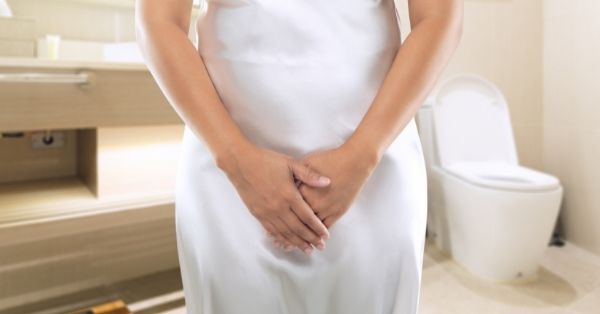Many women have a very regular cycle and they know exactly when their period is going to show up – lucky them! But mother nature likes to keep us women on our toes and often throws us a curve ball, so if she has done just that to you and you are wondering why am I feeling wet but no period? Keep reading.
Feeling Wet But No Period – What Can It Be?
Have you ever been out and about and then got stopped in your tracks as you feel intense moisture in your underwear only to realize that aunt flo hasn’t arrived? The feeling wet but no period can be completely normal however it can also indicate hormonal changes, arousal, infections, and sometimes pregnancy.

Why Do I Feel Wet But No Period?
We really need to give credit to our vagin`as. They transition so much as we grow, from puberty to hormonal changes to birthing life our vagin`as are incredible. But there is always one thing we women dread, the unexpected arrival of our period. Let’s get one thing straight when it arrives there is usually a little bit of us that can either be relieved ( if you suspect an unwanted pregnancy) or saddened that it has arrived.
Many times we women get the feeling of wetness but no period. But why? What do our bodies go through for this wet feeling in our pants?
Well, the typical answer would be discharge.
Why Do I Have Watery Discharge?
Discharge is the water-like substance that is expelled from your vag throughout your cycles. It could be the reason you feel wet but no period still.
The amount of discharge can vary from woman to woman but it is present in every female who is still menstruating.
Discharge can differ under the following conditions:
- Hormones.
- Pregnancy.
- Where you are in your cycle.
- Infections.
- Age.
On average most women can lose from 1 to 4 ml of discharge every day! According to leading research discharge is typically white-yellow in color and is generally odorless. It tends to be higher if your estrogen levels increase so it does make sense to see higher levels of discharge when on estrogen-enhanced birth control!
What Else Could Cause Wetness?
Now we have discussed discharge, let us look at why levels may alter throughout our lives.
‣ Ovulation
This can increase the presence of a watery discharge. Women usually indicate their most fertile days when they see a watery discharge. The cervix creates more mucus when it is ready to receive an egg. In pregnancy the cervix creates a mucus plug but if there is no pregnancy the excess mucus collects in your pants. Depending on the amount you lose you can opt to wear a panty liner to ensure your underwear is protected.
‣ Pregnancy
In pregnancy, the vag and cervix start changing before you recognize you have conceived. The need for discharge is important during the early stages of pregnancy as any bacteria is flushed out of the vag leaving a nice safe incubator for your bub to grow. As your pregnancy continues the discharge you see will almost be the same consistency as urine but don’t panic you won’t be the first one to think they have had an accident.
As you are probably aware hormones go off like fireworks during pregnancy so the vag is simply reacting to the cocktail of hormone changes going on in your body.

‣ Arousal
When we get aroused our vags prepare for intercourse, creating a wet surface area on the vagin`al walls means that our body is preparing for sexual activity. Making you feel wet downstairs is letting you know that your body is responding to the rush of blood in the vag especially if you are having some private time with your partner.
Don’t forget these glands can spring into action when your not in a sexual position. Noticing you are moist when looking at tomatoes in the grocery store does not mean you are weird! It is known as non-concordance arousal when your body has reacted totally differently from our minds.
‣ Menopause
Menopause typically happens when you are 44-55 and it can last for years. You start noticing symptoms when your body begins the decline of estrogen and progesterone.
Perimenopause happens as these hormone levels decline and this can have a huge effect on what you find in your underwear. Discharge can increase or decrease during this stage of your life meaning you could feel wetter or dryer than usual.
‣ Infection
If you have excessive discharge then it could be pointing to an infection. STIs can cause discharge as your vag is fighting to expel the bacteria. If you notice a change in color or odor of your discharge then seek medical advice as it is common to have a vagin`al infection.
‣ Incontinence
This is a real issue for many women. Our bodies go through what men may deem impossible. We bleed once a month for up to a week at a time and can grow an entire human from inside ourselves to birth via the vag. Our bodies are truly incredible. Over the years we expect our bodies to maintain their normal functions but whether you have had children or not some things can get a little slack with old age.
If you have the feeling of wetness yet are sure it is not discharge then it could be a little urine. Speaking from experience after having my two children it took a while for me to strengthen my pelvic floor muscles to keep the wee where it should be. Sneezing, laughing, and coughing all put pressure on my bladder leaving me feeling a little wet and uncomfortable.
Cramps and Wet But No Period
According to medical news today, cramps, discharge, and no period can be a sign of pregnancy, infection, or pelvic inflammatory disease.
‣ Signs of Pregnancy
If you suspect you are pregnant the only way to know for sure is if you have a missed period and a positive pregnancy test.
Alongside these you may experience the following symptoms:
- Nausea
- Vomiting
- Headaches
- Cramping
- Tender breasts
- Lighter bleeding
- Bloating
- Changes in mood
Experiencing stomach cramps can often be a pregnancy symptom but they are never as bad as menstrual cramps, just the niggling pain as your ligaments grow and stretch.
As mentioned above the cervix prepares your body for the fertilization and implantation of an embryo. Until your body creates the mucus plug it will make excess watery discharge to rid any harmful bacteria within your vag.
‣ Yeast infection
Yeast infections are not dirty or a hygiene issue. They are extremely common amongst women in fact every woman is thought to get a yeast infection at least once in their life.
Symptoms of infection are:
- Increased discharge (that may have an odor) can leave the unpleasant feeling of wet discharge but no period.
- Burning
- Itching
The overgrowth of Candida fungus can create these unpleasant symptoms leaving you super uncomfortable.
To diagnose a yeast infection a swab will be taken from your vag and tested for fungal bacteria.
Treatment is relatively straightforward with an anti-fungal cream, ointments, or suppositories to insert into the vag.
Talking from experience there is nothing more uncomfortable than a yeast infection but once you start treatment you can be back to your regular self in no time.
‣ Pelvic Inflammatory Disease
The answer to the question “why am I feeling wet but no period?” Could be as a result of PID. Sexually transmitted infections are contracted when one person has unprotected sex with another infected person and if left untreated then it can cause PID.
Known as an infection of the reproductive system PID is known to cause cramping and make unusual differences to the discharge you lose.
Doctors will ask for a brief detail of your sexual background and treat it with antibiotics. If you suspect that you could be at risk from an STI then get help sooner rather than later to prevent further reproductive complications.
When To Seek Advice about Feeling of Wetness but no Period
The best time to seek medical advice is when you notice a considerable difference. If you are thinking I feel wet but no period then it is important that you don’t wait.
The feeling of being wet down below can be embarrassing for us ladies and under normal circumstances can be totally normal. If you are ever concerned you can request an examination from a female practitioner, it is highly likely they have experienced the same symptoms from time to time so they will understand exactly how you feel.
Wrapping Up
As a woman you will understand your own body as it fluctuates through cycles and pregnancy. Feeling wet but no period can be normal as your body transitions from stage to stage.
It can be embarrassing to seek help and you may be tempted to wait it out but be sure medical professionals are exactly that – Professional! No matter how embarrassed you may feel, be sure that they will treat your symptoms with dignity and respond in the most sensitive way. Burying your head will not help and can make your symptoms worse.
Don’t suffer in silence, get a check up!
More to Read: